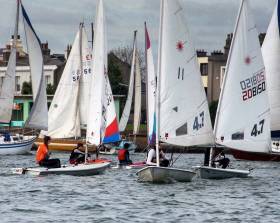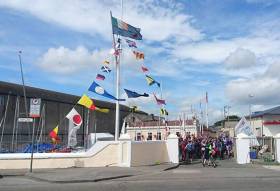Displaying items by tag: Sail Against Suicide
Clontarf Yacht and Boat Club will host its fourth annual Sail Against Suicide event on Saturday 25 August from 10am to 4pm.
Sail Against Suicide event is an initiative from Jessica Clohisey, one of the junior members of the club on Dublin’s Northside, who wanted to share her love of sailing while raising awareness about suicide.
“Clontarf Yacht & Boat Club is a community based, volunteer run club and we are keen to provide constructive support to the wider community,” said Commodore Andrew Semple.
“Mental health and the challenges around the issue are very really important and this event does a lot to provide information and raise awareness.”
Semple emphasised that Sail Against Suicide “is not a fundraising event – its purpose is simply to raise awareness of mental health issues that affect every community in Ireland and bring the topic into focus.”
This year’s day is also a Try Sailing event, part of the programme launched by Irish Sailing to encourage more people to take up sailing and other watersports.
“Participants can just turn up and we will get them out sailing all for free,” Semple said. “Clontarf Yacht & Boat Club have combined Try Sailing with Sail Against Suicide as the mental health benefits of sailing are well documented and we want to encourage as many people as possible to the club to raise awareness and have some fun.
“This is a free fun event. We aim to get 150 people on the water and will welcome more watching from the promenade. There will be music, food, entertainment, information and, above all, awareness.”
The Try Sailing Event is open to all. For more information or to register to go out sailing, contact [email protected].
Clontarf Prepares To Sail Against Suicide
#CB&YC - Sail Against Suicide will take place for the second year running on Saturday 9 September hosted by the Clontarf Yacht & Boat Club.
The event was started last year by local youth sailor Jessica Clohisey, inspired by her role as a student leader ambassador for Cycle Against Suicide — an annual initiative to combat the negative stigma surrounding mental health.
Clohisey’s efforts were met with overwhelming support from the community, who kindly donated over €1,000 that was split between Cycle Against Suicide and mental health charity Aware, as Clontarf.ie reports.
Sail Against Suicide is not a fundraising event — its purpose is simply to raise awareness of mental health issues that affect every community in Ireland and bring the topic into focus.
TheJournal.ie recently spoke to Clohisey about her awareness-raising efforts.






























































